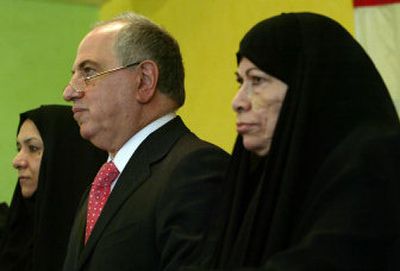Chalabi arrives in U.S. today amid questions about past

BAGHDAD, Iraq – When Ahmad Chalabi launched his campaign for parliament at Baghdad’s elite Hunting Club last week, organizers made sure his supporters were up front and the journalists in the back, too far away to hear what was being said or ask questions.
His political followers politely inquired about his candidacy and campaign. When an American reporter asked Chalabi to speak up because those in the back couldn’t hear, Chalabi said: “That’s enough,” and ended the news conference.
Chalabi has good reasons to avoid answering too many of the tricky questions swirling around his controversial career, as a convicted embezzler, as the source of much of the ultimately false intelligence on weapons of mass destruction that drove America to war, as the subject of an investigation into intelligence leaks to Iran and most recently as Iraq’s deputy prime minister.
But they will doubtless accompany him when he arrives today in Washington on his first official visit since the U.S. invasion and his subsequent falling-out with his one-time American benefactors.
U.S. officials are downplaying the eight-day trip, calling it a routine visit by an Iraqi official whose responsibilities in areas such as infrastructure, oil and finance require him to meet with Washington officials. He is scheduled to meet, among others, with Treasury Secretary John Snow and Secretary of State Condoleezza Rice, and on Wednesday he is due to address the American Enterprise Institute, a conservative think tank.
“We’ve invited him to the United States to discuss those issues, and I wouldn’t read more into it than that,” said a U.S. official in Baghdad, speaking on condition of anonymity.
Chalabi also dismissed the idea that the visit signifies the rehabilitation of his relationship with the United States. “I believe there was no wall of ice between me and Washington,” he said at his campaign launch.
But the visit has been endowed with added intrigue by Chalabi’s unexpected trip to Tehran over the weekend, during which he met with Iran’s hard-line new president, Mahmoud Ahmadinejad, only days after Ahmadinejad had been rebuked around the world for calling for Israel to be wiped off the map.
Rumors have swirled in the Iraqi news media that Chalabi may be carrying a message from Tehran for U.S. officials. In an interview in Tehran with the Financial Times, Chalabi said his visit had focused on economic and security cooperation.
But the side trip raises another question, as to where Chalabi’s loyalties really lie.
Until the U.S. invasion, Chalabi’s credentials were hardly questioned. The MIT graduate who earned his doctorate at the University of Chicago was the Pentagon’s favored candidate to lead the new Iraq, and he was flown from exile back to Iraq aboard a U.S. military plane.
In May 2004, the friendship soured. U.S. forces raided his compound and confiscated his computers and documents amid hints, but no evidence, of financial impropriety. In Washington, unnamed sources told newspapers it had been Chalabi who was responsible for betraying to Tehran the fact that the United States had broken a key Iranian code, thereby compromising vital American intelligence.
Yet the falling-out served Chalabi’s political fortunes well. Just as public opinion was swinging heavily against the U.S. occupation, Chalabi was seen to be in step with the times. He forged a close friendship with one of America’s biggest foes, the populist rebel cleric Muqtada al-Sadr, and secured himself a prominent role within the United Iraqi Alliance, the coalition of pro-Iranian Shiite parties that won the biggest share of the vote in January’s election.